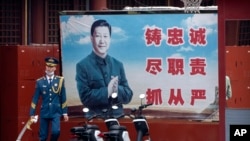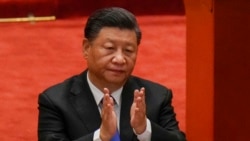China's leaders have approved a resolution on the history of the ruling Communist Party that was expected to set the stage for President Xi Jinping to extend his rule next year.
The official Xinhua News Agency said the resolution on the major achievements and historical experience of the party was adopted during a four-day meeting of its Central Committee that ended Thursday.
The move is expected to give Xi status beside the ruling Communist Party's most important figures. The statement is only the third statement of its kind in the party's 100-year history after one issued under Mao Zedong, who led the party to power in 1949, and Deng Xiaoping, who launched reforms that turned China into an economic powerhouse.
Issuing a similar statement under Xi would confirm he has amassed enough authority to ignore two-decade-old party practice that says he should step down next year when his second five-year term as general secretary ends.
The party removed term limits on Xi's post as president in 2018, indicating his intention to stay in power.
The history statement is expected to emphasize the party's successes in overseeing China's economic rise and likely ignore deadly political violence in its early decades in power and growing complaints about human rights abuses.
When term limits on the presidency were abolished in 2018, officials told reporters Xi might need more time to make sure economic and other reforms were carried out.
Xi faces no obvious rivals, but a bid to say in power has the potential to alienate younger party figures who might see their chances for promotion diminished.
Also, political scientists point to the experience of other countries in Asia, Africa and Latin America and warn long periods of one-person rule lead to worse official decisions and economic performance.
Xi has used his control of the party's vast propaganda apparatus to promote his image.
State media associate him with national successes including fighting the coronavirus, China's rise as a technology creator and last year's successful lunar mission to bring back moon rocks.
The 1981 assessment under Deng distanced the party from the violent upheaval of the ultra-radical 1966-76 Cultural Revolution.
By contrast, Xi has promoted a positive image of the party's early decades in power and called for it to revive its “original mission” as China's leading economic, political and cultural force.

